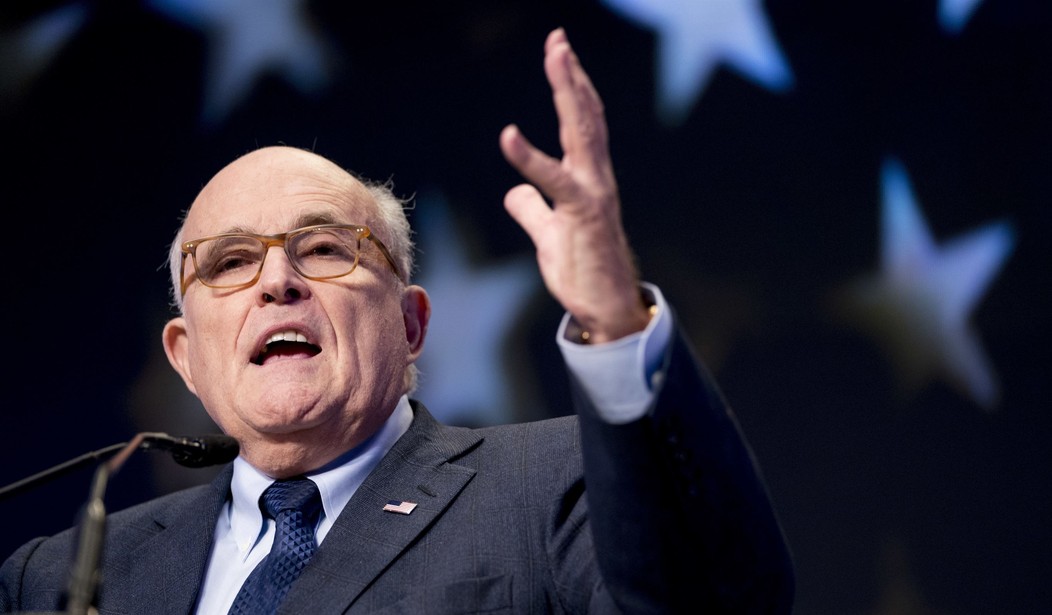Last weekend, the White House leaked a copy of a letter sent by President Donald Trump's legal team on Jan. 29 to special counsel Robert Mueller. The letter set forth the president's legal strategy, arguing essentially that he is immune from prosecution for any crime.
To soften the tone of this poorly received letter, the White House dispatched Rudy Giuliani, the president's most visible legal spokesperson, to address the issues that his colleagues had raised. He made matters worse when he suggested that if the president ordered Jim Comey "shot in the Oval Office," he couldn't be prosecuted because the president can pardon himself and because the president's personal and presidential behavior is beyond the reach of the criminal justice system.
Giuliani was supposed to be making a principled case for why the president cannot be subpoenaed to testify before a grand jury, and he ended up discussing absurd hypotheticals about a self-pardon and shooting the former FBI director in the White House.
Here is the back story.
Trump's lawyers' letter argued that obstruction of justice refers to interference with a judicial proceeding and that an FBI investigation is not a judicial proceeding. That was the law before 2002, but an amendment adopted that year provided that any corrupt interference with an FBI investigation that is aimed at producing evidence for a grand jury constitutes obstruction of justice.
The letter's second argument offered that Trump could not have committed obstruction of justice because he controls all that is done in the executive branch and decides what is just, whom to prosecute and whom to overlook. This is the Nixonian argument that "when the president does it, that means that it is not illegal," which was rejected by the lessons of Watergate.
Recommended
The president is not a king. He took an oath to uphold the Constitution. That includes the rule of law. The rule of law has three unassailable elements. 1) No one is beneath the law's protections. 2) No one is above the law's requirements. 3) No one can be a prosecutor or judge in his own case. The Giuliani argument over the weekend that Trump could have Comey shot in the Oval Office with impunity is not only needlessly tasteless and patently absurd but also contrary to the rule of law, and it is an invitation to presidential lawlessness.
In Giuliani's hypothetical, Trump would be arrested for murder if Comey died. He would be indicted for murder, but he would not be tried until his term in office is complete. That's because the judicial system must respect the president's prerogatives of office while he is in office.
If Trump fired Comey as FBI director because he couldn't stand to be in a room with a guy taller than he is, Trump committed no wrong. But if he fired Comey because he wanted to stop the Russia investigation -- which is essentially what he told NBC News' Lester Holt -- that was using the machinery of the presidency for a corrupt purpose, which is the essence of obstruction.
The president can be charged with obstruction anytime a grand jury finds probable cause of his guilt, but just as in the Giuliani shooting hypothetical, he cannot be tried until the day after he leaves office.
The Trump team letter committed a third error by failing to address United States v. Nixon, a 1974 Supreme Court case that addressed subpoenas to the president. The Nixon case makes clear that the president enjoys broad and wide executive privilege -- the ability to keep presidential documents and testimony away from Congress and the courts -- in his ordinary work.
But the Nixon case also makes clear that executive privilege is reduced radically in a criminal investigation. If subpoenaed in that context, the president must surrender documents and give testimony on all relevant matters demanded by the prosecutors, except for military secrets, diplomatic secrets and sensitive national security matters. None of those pertains to Mueller's likely subpoena to Trump, and Giuliani knows that.
Can the president pardon himself?
The short answer is: No one knows. The longer answer is: Why would the president's lawyer be offering this argument? The president has vehemently denied any wrongdoing, so why discuss pardoning oneself? The president's pardoning power has no limits in the Constitution. Yet the rule-of-law principle that one cannot be the prosecutor or judge in one's own case suggests that the president's pardoning power is limited to people other than himself. It is hard for me to believe that a court confronted with an indictment of Trump would dismiss it in deference to Trump's self-pardon.
After Giuliani offered his views on a presidential self-pardon and a presidential shooting, the president jumped into the fray and tweeted that he can pardon himself; and by the way, the United States Office of Special Counsel is unconstitutional. I was shocked to see that opinion because that office is authorized by the Federal Rules of Criminal Procedure, which Congress adopted and has been validated by six federal judges. Moreover, the president himself sanctioned Russian intelligence agents that one of the special counsel's grand juries indicted. If that office is unconstitutional, why are the president's lawyers interacting with it?
I am unhappily surprised and deeply disappointed by the poor quality of public lawyering in Trump's behalf that we have seen thus far. The Jan. 29 letter would have flunked a law school course in criminal procedure. The Giuliani hysterics have substantially diminished the professional reputation of one of the country's more formidable ex-prosecutors, have offered known untruths and have become the legal equivalent of throwing gasoline on a fire.
None of this is good for Donald Trump, whose legal woes continue to grow in spite of his legal team's efforts to minimize them.

























Join the conversation as a VIP Member